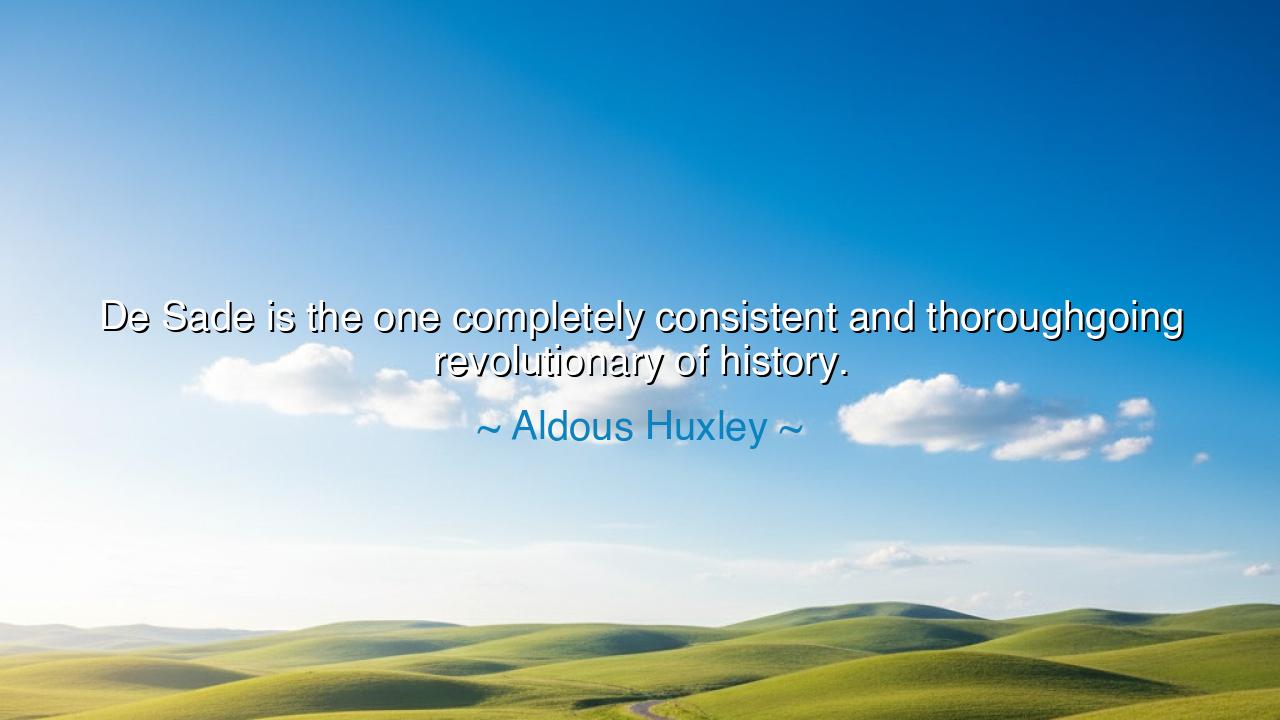
De Sade is the one completely consistent and thoroughgoing






Aldous Huxley, the philosopher of vision and warning, once wrote: “De Sade is the one completely consistent and thoroughgoing revolutionary of history.” In this haunting declaration lies not admiration, but a profound caution — a reflection on what it truly means to rebel without restraint. For Huxley, that master of paradox, saw in the Marquis de Sade the terrifying purity of revolution unbound by morality, a mind that sought freedom not to uplift man, but to unmake him. Through these words, he does not praise De Sade, but rather reveals the dark culmination of absolute revolt — the point at which liberation becomes destruction, and revolution devours its own soul.
The meaning of this quote lies in Huxley’s understanding that every revolution is born of discontent, but sustained by belief. Most revolutionaries claim to seek justice, equality, or enlightenment — they overthrow one order to build another. Yet De Sade, in his writings and philosophy, sought something deeper and far more terrible: the total liberation of desire, the destruction of all moral, social, and divine limits. He is, to Huxley, the “completely consistent” revolutionary because he carries the logic of rebellion to its ultimate end — freedom without virtue, will without conscience, power without mercy.
The origin of Huxley’s insight comes from his meditation on the Enlightenment — that age of reason which promised light, but often gave birth to shadow. In the 18th century, men proclaimed liberty and reason as gods, casting aside the old faiths and kings. Yet in this age of human perfectibility, the Marquis de Sade emerged as a voice of cruel clarity. While others spoke of freedom for the betterment of man, De Sade stripped it of its idealism and asked: what if freedom means the freedom to dominate, to harm, to indulge every impulse without limit? He exposed the monstrous possibility hidden in man’s pursuit of unfettered autonomy.
Consider the French Revolution, that storm of blood and ideals which promised to liberate mankind from tyranny. It began with hymns of justice and fraternity, yet ended in terror and the guillotine. De Sade lived through this era and saw, perhaps more clearly than most, the hypocrisy of men who claimed virtue while practicing violence. To him, morality itself was the last tyranny — a chain upon the will. Thus, he imagined a world where man is god, and desire is law. In doing so, he became the mirror of the Revolution’s shadow, reflecting its hidden hunger for absolute power. Huxley recognized in this that De Sade was not a deviation, but a completion — the logical endpoint of rebellion divorced from ethics.
In this sense, De Sade’s “consistency” is both his greatness and his damnation. He never pretended to fight for noble ideals. He did not wrap his philosophy in righteousness. He tore away the veils and showed the world what revolution looks like when it abandons all higher principle — a fire that burns endlessly, consuming creator and creation alike. His world is one where God is dead, virtue is mockery, and the only truth is the pleasure of power. To Huxley, who lived through the rise of totalitarian regimes and the moral chaos of modernity, De Sade was not a relic of the past, but a prophet of the world to come — a world where freedom, if left unchecked, becomes the engine of annihilation.
History offers many reflections of this truth. When Lenin and later Stalin sought to create a paradise of equality, they too began with revolution and ended with tyranny. The same fire that destroyed the old order consumed the new. And in the 20th century, as science unchained itself from morality, mankind discovered how to split the atom — and with it, the potential to destroy its own world. These are the children of De Sade’s consistency — not in name, but in essence. For when man worships freedom without wisdom, he becomes a slave to his own will. When he dethrones God but fails to enthrone conscience, he builds an empire of ruin.
The lesson of Huxley’s reflection is therefore both grave and luminous. To rebel is not evil, for without rebellion there is no progress. But rebellion must be guided by conscience, by the compass of truth that points beyond the self. Freedom without virtue is chaos; power without humility is madness. The true revolutionary is not the one who destroys, but the one who transforms — who breaks the old only to build the better, and whose courage is tempered by compassion.
So, my children of thought, hear the wisdom hidden in Huxley’s warning: be wary of the revolution within — that whispering fire that seeks to free you from all law, even the law of goodness. Question the world, but also question your own desires. Create, but with reverence. Change, but with conscience. For the greatest revolution is not in the streets, but in the soul — when man learns to master his own power, to balance freedom with virtue, and to wield creation not as a weapon, but as an act of love. Only then does revolution become redemption, and freedom, at last, become holy.






AAdministratorAdministrator
Welcome, honored guests. Please leave a comment, we will respond soon